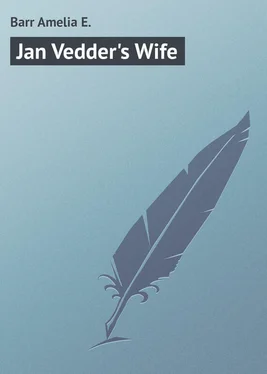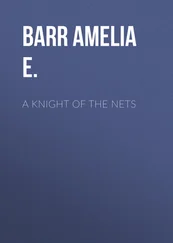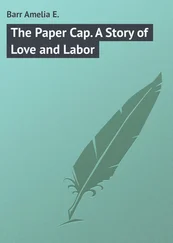Amelia Barr - Jan Vedder's Wife
Здесь есть возможность читать онлайн «Amelia Barr - Jan Vedder's Wife» — ознакомительный отрывок электронной книги совершенно бесплатно, а после прочтения отрывка купить полную версию. В некоторых случаях можно слушать аудио, скачать через торрент в формате fb2 и присутствует краткое содержание. Издательство: Иностранный паблик, Жанр: foreign_prose, на английском языке. Описание произведения, (предисловие) а так же отзывы посетителей доступны на портале библиотеки ЛибКат.
- Название:Jan Vedder's Wife
- Автор:
- Издательство:Иностранный паблик
- Жанр:
- Год:неизвестен
- ISBN:нет данных
- Рейтинг книги:5 / 5. Голосов: 1
-
Избранное:Добавить в избранное
- Отзывы:
-
Ваша оценка:
- 100
- 1
- 2
- 3
- 4
- 5
Jan Vedder's Wife: краткое содержание, описание и аннотация
Предлагаем к чтению аннотацию, описание, краткое содержание или предисловие (зависит от того, что написал сам автор книги «Jan Vedder's Wife»). Если вы не нашли необходимую информацию о книге — напишите в комментариях, мы постараемся отыскать её.
Jan Vedder's Wife — читать онлайн ознакомительный отрывок
Ниже представлен текст книги, разбитый по страницам. Система сохранения места последней прочитанной страницы, позволяет с удобством читать онлайн бесплатно книгу «Jan Vedder's Wife», без необходимости каждый раз заново искать на чём Вы остановились. Поставьте закладку, и сможете в любой момент перейти на страницу, на которой закончили чтение.
Интервал:
Закладка:
During these days Jan and Snorro drew very close to each other. When the baits were set most of the men went to sleep for three hours; but Snorro always watched, and very often Jan sat with him. And oh, the grand solemnity and serenity of these summer nights, when through belts of calm the boats drifted and the islands in a charmed circle filled the pale purple horizon before them. Most fair then was the treeless land, and very far off seemed the sin and sorrow of life. The men lay upon the deck, with a pile of nets or their folded arms for a pillow, and surely under such a sky, like Jacob of old, they dreamed of angels.
Snorro and Jan, sitting in the soft, mystical light, talked together, dropping their voices involuntarily, and speaking slowly, with thoughtful pauses between the sentences. When they were not talking, Snorro read, and the book was ever the same, the book of the Four Gospels. Jan often watched him when he thought Jan asleep. In that enchanted midnight glow, which was often a blending of four lights – moonlight and twilight, the aurora and the dawning – the gigantic figure and white face, bending over the little book, had a weird and almost supernatural interest. Then this man, poor, ugly, and despised, had an incomparable nobility, and he fascinated Jan.
One night he said to him, “Art thou never weary of reading that same book, Snorro?”
“Am I then ever weary of thee, my Jan? And these are the words of One who was the first who loved me. Accordingly, how well I know his voice.” Then, in a fervor of adoring affection, he talked to Jan of his dear Lord Christ, “who had stretched out his arms upon the cross that he might embrace the world.” And as he talked the men, one by one, raised themselves on their elbows and listened; and the theme transfigured Snorro, and he stood erect with uplifted face, and looked, in spite of his fisher’s suit, so royal that Jan felt humbled in his presence. And when he had told, in his own simple, grand way, the story of him who had often toiled at midnight with the fishers on the Galilean sea, as they toiled upon the Shetland waters, there was a great silence, until Jan said, in a voice that seemed almost strange to them: “Well, then, mates, now we will look to the lines.”
All summer, and until the middle of October, Jan continued at sea; and all summer, whether fishing for ling, cod, or herring, “The Fair Margaret” had exceptionally good fortune. There were many other fishers who woke, and watched, and toiled in their fishing, who did not have half her “takes.” “It is all Jan’s luck,” said Glumm, “for it is well known that he flings his nets and goes to sleep while they fill.”
“Well, then, ‘it is the net of the sleeping fisherman takes:’ that is the wise saying of old times” – and though Snorro did not think of it, the Shetland proverb was but the Norse form of the Hebrew faith: “He giveth his beloved in their sleep.”
Still, in spite of his success, Jan was not happy. A married man’s happiness is in the hands of his wife, and Margaret felt too injured to be generous. She was not happy, and she thought it only just that Jan should be made to feel it. He had disappointed all her hopes and aspirations; she was not magnanimous enough to rejoice in the success of his labors and aims. Besides, his situation as the hired skipper of a boat was contemptible in her eyes; her servant was engaged to a man in the same position. Another aggravating circumstance was that her old schoolmate, the minister’s niece (a girl who had not a penny piece to her fortune) was going to marry a rich merchant from Kirkwall. How she would exult over “Margaret Vedder who had married a common fisherman.” The exultation was entirely imaginary, but perhaps it hurt as much as if it had been actually made.
Success, too, had made Jan more independent: or perhaps he had grown indifferent to Margaret’s anger, since he found it impossible to please her. At any rate, he asked his friends to his house without fear or apology. They left their footmarks on her floors, and their fingermarks upon her walls and cushions, and Jan only laughed and said, “There was, as every one knew, plenty of water in Shetland to make them clean again.” Numberless other little things grieved and offended her, so little that, taken separately, they might have raised a smile, but in the aggregate they attained the magnitude of real wrongs.
But, happy or miserable, time goes on, and about the middle of October even the herring fishing is over. Peter was beginning to count up his expenses and his gains. Jan and Snorro were saying to one another, “In two days we must go back to the store.” That is, they were trying to say it, but the air was so full of shrieks that no human voice could be heard. For all around the boat the sea was boiling with herring fry, and over them hung tens of thousands of gulls and terns. Marmots and guillemots were packed in great black masses on the white foam, and only a mad human mob of screaming women and children could have made a noise comparable. Even that would have wanted the piercing metallic ring of the wild birds’ shriek.
Suddenly Snorro leaped to his feet. “I see a storm, Jan. Lower and lash down the mast. We shall have bare time.”
Jan saw that the birds had risen and were making for the rocks. In a few minutes down came the wind from the north-east, and a streak of white rain flying across the black sea was on top of “The Fair Margaret” before the mast was well secured. As for the nets, Snorro was cutting them loose, and in a few moments the boat was tearing down before the wind. It was a wild squall; some of the fishing fleet went to the bottom with all their crews. “The Fair Margaret,” at much risk of loss, saved Glumm’s crew, and then had all she could manage to raise her mizzen, and with small canvas edge away to windward for the entrance of Lerwick bay.
Jan was greatly distressed. “Hard to bear is this thing, Snorro,” he said; “at the last to have such bad fortune.”
“It is a better ending than might have been. Think only of that, Jan.”
“But Peter will count his lost nets; there is nothing else he will think of.”
“Between nets and men’s lives, there is only one choice.”
Peter said that also, but he was nevertheless very angry. The loss took possession of his mind, and excluded all memory of his gains. “It was just like Jan and Snorro,” he muttered, “to be troubling themselves with other boats. In a sudden storm, a boat’s crew should mind only its own safety.” These thoughts were in his heart, though he did not dare to form them into any clear shape. But just as a drop or two of ink will diffuse itself through a glass of pure water and defile the whole, so they poisoned every feeling of kindness which he had to Jan.
“What did I tell thee?” he said to Thora, bitterly. “Jan does nothing well but he spoils it. Here, at the end of the season, for a little gust of wind, he loses both nets and tackle.”
“He did well when he saved life, Peter.”
“Every man should mind his own affairs. Glumm would have done that thing first.”
“Then Glumm would have been little of a man. And thou, Peter Fae, would have been the first to tell Glumm so. Thou art saying evil, and dost not mean it.”
“Speak no more. It is little a woman understands. Her words are always like a contrary wind.”
Peter was very sulky for some days, and when at last he was ready to settle with Jan, there was a decided quarrel. Jan believed himself to be unfairly dealt with, and bitter words were spoken on both sides. In reality, Peter knew that he had been hard with his son, harder by far than he had ever intended to be; but in his heart there had sprung up one of those sudden and unreasonable dislikes which we have all experienced, and for which no explanation is possible. It was not altogether the loss of the nets – he did not know what it was – but the man he liked, and praised, and was proud of one week, he could hardly endure to see or speak to the next.
Читать дальшеИнтервал:
Закладка:
Похожие книги на «Jan Vedder's Wife»
Представляем Вашему вниманию похожие книги на «Jan Vedder's Wife» списком для выбора. Мы отобрали схожую по названию и смыслу литературу в надежде предоставить читателям больше вариантов отыскать новые, интересные, ещё непрочитанные произведения.
Обсуждение, отзывы о книге «Jan Vedder's Wife» и просто собственные мнения читателей. Оставьте ваши комментарии, напишите, что Вы думаете о произведении, его смысле или главных героях. Укажите что конкретно понравилось, а что нет, и почему Вы так считаете.












